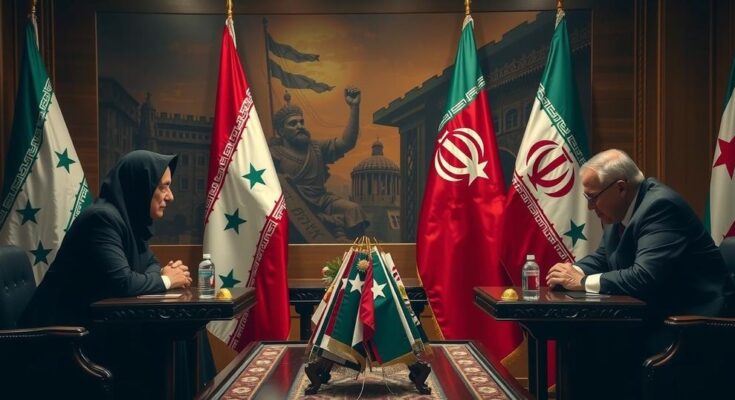Iran’s Foreign Minister Abbas Araghchi is set to visit Damascus, showing support for President Bashar al-Assad’s regime following the Islamist insurgent capture of Aleppo. The meeting comes amid rising tensions and significant regional concern from allies like Russia and Iran over the insurgent threat. The conflict continues to evolve, with various factions vying for control in the region and foreign airstrikes intensifying in opposition-held areas.
In a significant display of diplomatic support, Iran’s Foreign Minister Abbas Araghchi is set to visit Damascus amid escalating challenges faced by the Syrian regime. The Iranian official aims to reinforce Tehran’s backing of President Bashar al-Assad’s government following the recent capture of Aleppo by Islamist insurgents. As the situation intensifies, key allies of the Syrian regime, including Russia and Iran, have expressed their concerns and coordinated responses to the insurgent threat.
In Aleppo’s fall, militant forces from Hayat Tahrir al-Sham rapidly advanced through northern Syria, eliciting alarm from Assad’s supporters. After a brief public absence, Assad re-engaged with regional partners, asserting that his government can withstand this offensive with allied support. Historically reliant on foreign assistance, the Syrian regime has faced growing challenges, particularly during previous conflicts where Russian and Iranian military aid played pivotal roles.
The recent territorial gains by Islamist fighters have alarmed international observers, prompting discussions among foreign ministers, including Lavrov of Russia and Araghchi. Both parties voiced deep concern over the escalating violence in Syria, tying the developments to support from the United States and Israel. Meanwhile, the U.S. has clarified its non-involvement in these current offensives, attributing the insurgents’ actions to prior enduring instability in the region.
As conflict unfolds, various rebel factions are capitalizing on the Syrian government’s retraction, and local reports indicate significant developments on the ground, including the seizure of military bases. Airstrikes by Syrian and Russian forces continue against opposition-held regions, further complicating the humanitarian situation in Idlib and other areas. Amidst this turmoil, the Assad regime aims to consolidate its defenses and mount counter-offensives against the rebel advances.
The current situation in Syria is characterized by a fragile balance of power following years of civil war that began in 2011. President Bashar al-Assad’s regime has relied heavily on military support from Iran and Russia to maintain its foothold in the country as insurgent groups have periodically challenged its control. The recent loss of Aleppo—once a strategic stronghold—underscores the ongoing volatility in northern Syria and the broader implications for regional stability. The involvement of foreign powers, including U.S. interests, has further complicated the dynamics of the conflict, as regional players recalibrate their strategies in response to shifting battle lines.
Iran’s diplomatic mission to Syria indicates a strategic response to the alarming developments following the fall of Aleppo. As President Assad seeks to regain control amidst insurgent advances, the importance of foreign alliances with Iran and Russia becomes increasingly evident. The conflict remains intensely rooted in historical grievances and geopolitical rivalries, leaving the future of Syria and its leadership precariously dependent on external support and military capability.
Original Source: www.theguardian.com




